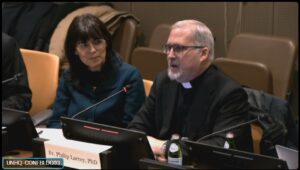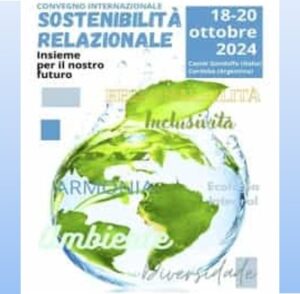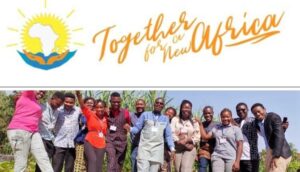
02.10.2023
Becoming “Change makers,” was the bold theme of the second edition of the Together for a New Africa (T4NA) Project Summer School that took place Sept. 11-15, 2023.
One hundred and forty participants along with their mentors from fourteen African countries-Kenya, Burundi, Madagascar, Nigeria, Cameroon, Togo, Burkina Faso, Mozambique, Uganda, Angola, Tanzania, Democratic Republic of Congo, Benin, and Côte d’Ivoire-and five European countries-Italy, Portugal, Spain, France, and Belgium-took part in this year’s program.
Their diverse academic and professional experiences and cultural backgrounds added value to the program, making these days an enriching exchange for each participant, both individually and collectively.
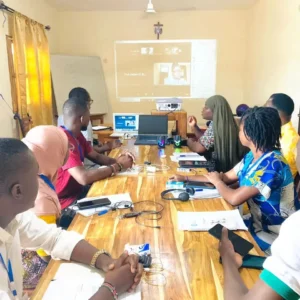
For five days, participants exchanged and shared ideas on leadership and collective leadership (co-leadership) in light of African values and cultures-such as Ubuntu, Ujamaa, Palavar-values that promote unity and the pursuit of the common good, emphasizing individual and group responsibility.
This second edition of T4NA opened with a timely idea: think globally and act locally, offering participants an opportunity to exchange ideas between African and European youth.
According to the organizers, “we young people need to take a global and multicultural view of leadership in the globalized society in which we live.”
“Society in today’s globalized world confronts us with global challenges and this requires us to have an open mind, to think globally, far beyond our immediate world but at the same time, be very concrete by doing our best locally. Concreteness is a commitment,” said Regina from Cameroon.
This opportunity was made possible through T4NA’s collaboration with AFRESH (Africa and Europe Same Horizon), a project co-founded by the European Commission and implemented by five European and five African partner associations.
Having the opportunity to follow the joint sessions online while being simultaneously gathering in presence in the various countries allowed participants to build moments of cohesion locally, to share their experiences and knowledge, but also to dig deeper into the issues and challenges of their respective communities, so that together they could consider how to become active change-makers in their own contexts.
Africa is a continent of contradictions. It makes sense that a continent that is home to fifty-four countries and 1.2 billion people is also home to many contradictory events. In addition to the major drivers of change observed in the last decade, there are also very heavy challenges.
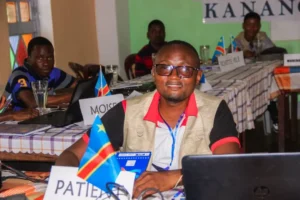
Young people discussed major issues such as climate change and food security, evoked the fact that much of the continent remains mired in debt, burdened by conflict and besieged by elites clinging to power.
Thankfully, the human cost of the Coronavirus pandemic has been less catastrophic than many feared, but its economic impact has undermined much of the continent’s growth, while the impact of the war in Ukraine on food and energy prices continues to be felt.
Africa is also the youngest part of the world and will be for a long time, experts say. By 2050, one in four people on Earth will be African. So there is a large number of young people with a lot of aspirations, thanks to another important element, which is access to technology.
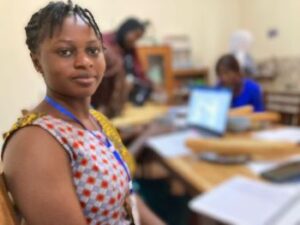
So a lot of young people, perhaps educated but not satisfied with their lives, see the possibilities, material and otherwise, of a standard of living in other parts of the world, and the kind of demand and expectation with respect to what some societies are able to offer as economic opportunities, creates some interesting tensions.
Justus Mbae, former vice chancellor of the Catholic University of East Africa, shared his views on the limitations of the education system, saying that he is convinced that African values need to be integrated into the education curriculum, calling on all those involved in education “to rethink the values transmitted, by our families. Because a healthy community starts at home, in the family.”
Somda, from Burkina Faso, said his conviction and commitment: “the solution to the problems of my country, and of the whole continent, requires a collective responsibility that cannot be left in the hands of just a few.”
Ghislaine Kahambu, coordinator of NetOne in the Democratic Republic of Congo, one of the moderators of the program, said she appreciated the constructive synergy between all the different actors.
This Summer School begins a three-year journey through which the cohort will have much to share.
Together for a New Africa project is coordinated by Sophia University in collaboration with partners including NetOne. Its goal is to empower young African leaders to address the various challenges of their communities in light of a culture of unity and thus shape the future of their continent.
Liliane Mugombozi


